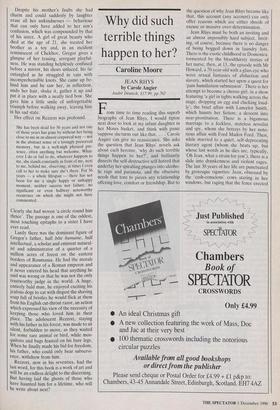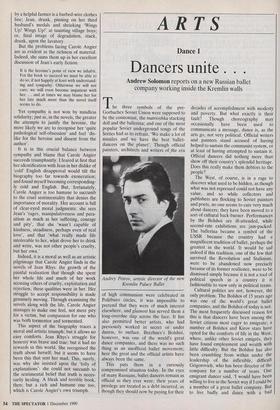Why did such terrible things happen to her?
Caroline Moore
JEAN RHYS by Carole Angier
Andre Deutsch, £17.99, pp.762
From time to time reading this superb biography of Jean Rhys, I would tiptoe next door to look at my infant daughter in her Moses basket, and think with panic `suppose she turns out like that. . . :Carole Angier can give no reassurance. She asks the question that Jean Rhys' novels ask about each heroine, 'why do such terrible things happen to her?', and brilliantly dissects the self-destructive self-hatred that underlay her spiralling plunges into alcoho- lic rage and paranoia, and the obsessive needs that tore to pieces any relationship offering love, comfort or friendship. But to
the question of why Jean Rhys became like that, this account (any account) can only offer reasons which are either shreds of excuse or massive over-determination.
Jean Rhys must be both an inviting and an almost impossibly hard subject. Invit- ing, of course, because there is no danger of being bogged down in laundry lists. There is the exotic childhood in Domenica, tormented by the bloodthirsty stories of her nurse; then, at 13, the episode with Mr Howard, a 70-year-old with a glass eye who wove sexual fantasies of abduction and slavery, which started her upon a quest for `pain humiliation submission'. There is her attempt to become a chorus girl, in a show featuring `a girl in tights walking across the stage, dropping an egg and clucking loud- ly'; the brief affair with Lancelot Smith, which haunts her fiction; a descent into near-prostitution. There is a bigamous marriage to a feckless, stateless novelist and spy, whom she betrays by her noto- rious affair with Ford Madox Ford. Then, while married to a quiet, self-deprecating literary agent (whom she beats up, but whose last words as he dies are, typically, `Oh Jean, what a strain for you'), there is a slide into drunkenness and violent rages. The last 30 years of her life are punctuated by grotesque vignettes: Jean, obsessed by the `cash-conscious' cows staring in her windows, but raging that the fence erected
by a helpful farmer is a barbed-wire clothes line; Jean, drunk, pinning on her third husband's medals and shrieking 'Wings Up! Wings Up!' at taunting village boys; or, final image of degradation, stuck, drunk, upon the lavatory.
But the problems facing Carole Angier are as evident as the richness of material. Indeed, she sums them up in her excellent discussion of Jean's early fiction:
It is the heroine's point of view we inhabit. For the book to succeed we must be able to do so, if not happily at least with understand- ing and sympathy. Otherwise we will not care; we will even become impatient with her. . . and at times we may blame her for her fate much more than the novel itself seems to do.
Yet sympathy is not won by mindless solidarity; just as, in the novels, the greater the attempts to justify the heroine, the more likely we are to recognise her 'quite pathological self-obsession' and feel 'dis- like for the heroine and dissent from the author'.
It is in this crucial balance between sympathy and blame that Carole Angier succeeds triumphantly. I feared at first that her identification with Jean in her dislike of `cold' English disapproval would tilt the biography too far towards exoneration; and found myself becoming corresponding- ly cold and English. But, fortunately, Carole Angier is too humane to succumb to the cruel sentimentality that denies the importance of morality. Her account is full of clear-eyed moral judgments: she sees Jean's 'rages, manipulativeness and para- sitism as much as her suffering, courage and pity', that she 'wasn't capable of kindness, steadiness, perhaps even of real love', and that 'what really made life intolerable to her, what drove her to drink and write, was not other people's cruelty, but her own.'
Indeed, it is a moral as well as an artistic pilgrimage that Carole Angier finds in the novels of Jean Rhys: the growth of the painful realisation that though she spent her whole life and much of her work accusing others of cruelty, exploitation and rejection, these qualities were in her. Her struggle to accept responsibility is made genuinely moving. Through examining the novels along with the life, Carole Angier manages to make one feel, not mere pity for a victim, but compassion for one who was both tormentor and tormented.
This aspect of the biography traces a moral and artistic triumph; but it allows no easy comforts. Jean Rhys's struggle for honesty was brave and true; but it had no rewards in this world. She recognised the truth about herself; but it seems to have been this that sent her mad. This, surely, was why she insisted upon the 'folly of explanations': she could not succumb to the sentimental belief that truth is neces- sarily healing. A bleak and terrible book, then; but a rich and humane one too, which is Carole Angier's own triumph.











































































 Previous page
Previous page